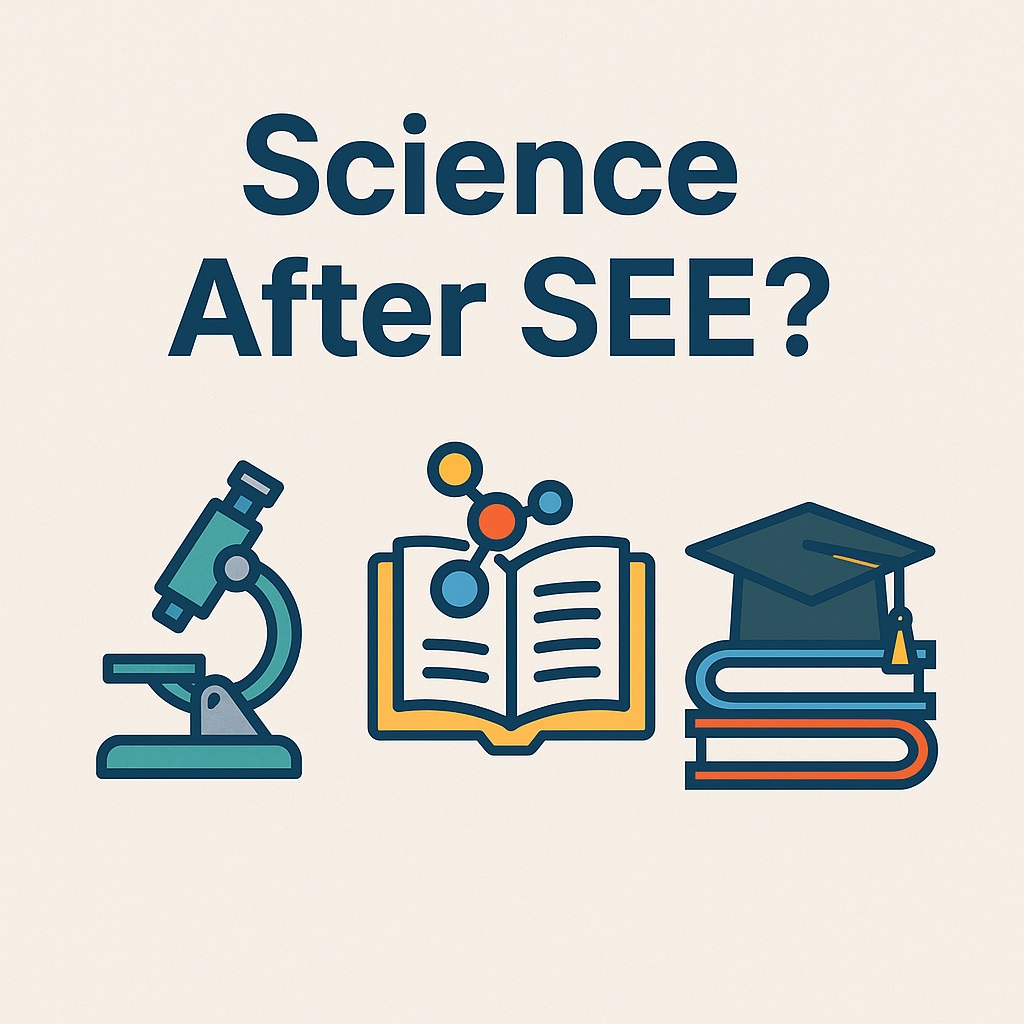
Understanding the Dilemma After SEE
Many students remain uncertain about choosing science after the Secondary Education Examination (SEE). Financial concerns, peer pressure, and lack of guidance often lead to wrong subject and college selection, resulting in regret.
Educational experts emphasize the importance of proper consultation among students, parents, and colleges if science is to be the subject of choice. Ramesh Silwal, Chairperson of Higher Secondary School Association Nepal (HISSAN) and operator of Golden Gate College, stresses the need to first understand the purpose of studying science.
Why Study Science After SEE?
According to Silwal, the demand of today’s world is science and technology. The foundation for producing such skilled manpower in Nepal begins right after SEE. Science is a discipline based on systematic study and facts.
Students who aim to pursue higher degrees like Master’s, MPhil, or PhD in science-related fields should begin from Grade 11. Many parents wish their children to become doctors or engineers. Science education helps fulfill these aspirations and ensures a secure future.
It also plays a crucial role in technical fields like agriculture, forestry, and IT. Thus, science becomes a strategic starting point.
Advantages of Studying Science
Silwal explains that students with a science background can later switch to management or humanities and still perform better due to their analytical training. He adds:
-
Science students develop systematic analysis skills.
-
They gain habits of regular study and fact-based reasoning.
-
These skills are highly beneficial for any profession.
Science also teaches students how to simplify complex topics, making other subjects easier to learn later.
Addressing the Fear of Mathematics
Some students hesitate due to the perception that science involves heavy mathematics. However, Silwal suggests viewing math as a part of daily life, not a burden. Even in management, accounting requires mathematical understanding.
Learning math through science prepares students better, even if they switch to management later. He dismisses the myth that science is extremely difficult and management is easier.
Golden Gate College aims to become a university and offers valuable opportunities for students. Silwal claims it ranks among the top 20 colleges in Nepal.
Career Priorities After Science
Rishi Tiwari, Principal of Pinnacle College, states that most science students initially aim for medical or engineering studies. Later, they may choose agriculture, forestry, or paramedics.
Recently, interest in IT engineering has surged. IT blends well with other higher education disciplines and enhances their value.
Tiwari emphasizes that science students are not restricted to specific fields:
-
They can enter economics or other disciplines later.
-
Science builds a strong foundation for diverse careers.
Two Streams in Science: Physical and Biological
Science students can choose between:
-
Physical Group: Suitable for structural and computer engineering. Students must study Physics, Chemistry, and Mathematics. Computer Science is also available.
-
Biological Group: Includes Biology alongside the subjects above. Opens pathways to medical, paramedical, management, economics, forestry, and agriculture.
Tiwari warns against the misconception that science is only for doctors and engineers. He encourages students to explore science due to its multidimensional potential.
Science and Studying Abroad
If students plan to study abroad after Grade 12, science is often the better option. International universities commonly offer IT, hotel management, and business programs. A strong foundation in science enhances competitiveness.
Science students can also pursue agriculture and veterinary studies abroad. Colleges offer scholarships, field visits, labs, and libraries to support students.
Broader Professional Opportunities
Hari Singh KC, Assistant Principal of Southwestern College, urges students not to hesitate after SEE. Science opens doors to many professional fields including:
-
Medicine
-
Engineering
-
Agriculture
-
Forestry
-
Management
-
Education
-
Humanities
He emphasizes:
-
Science is technical.
-
It develops a habit of hard work.
-
It helps control distractions common in teenage years.
-
It builds discipline for future studies and careers.
According to KC, science is ideal for students who plan to go abroad. Foreign universities prefer hardworking students with strong GPA and good subjects—qualities fostered by science education.
His college provides merit-based scholarships and encourages students from public schools who demonstrate motivation and potential.
Let Students Decide Their Path: Silwal
Silwal views SEE graduates as malleable like raw clay. Their age, mindset, and physical development are at a stage where they can be shaped in any direction. Therefore, parents must understand and guide them properly.
He says:
-
Parents should analyze children's interests and skills.
-
Avoid forcing them into any subject without understanding.
In Nepal, academic pressure from parents is common, but Silwal discourages it. He shares an example where five students with a 4.0 GPA enrolled in management—three had parents wanting to push them toward medicine or engineering, while two had supportive parents who respected their children's choice.
Silwal highlights that:
-
A central bank governor needs knowledge in economics or management.
-
Doctors or engineers cannot lead financial or development institutions.
-
Similarly, management graduates cannot treat patients or build cities.
Hence, every subject has value. What matters is having command over the chosen field.
What to Consider While Choosing a College
Students and parents must research the purpose and background of a college. Avoid institutions that treat education as a temporary business.
Silwal believes:
-
Education is not just about reading textbooks and scoring marks.
-
It must build knowledge, values, skills, and patriotism.
Colleges should:
-
Inspire students by showing that they can have a future in Nepal.
-
Conduct student-centered classroom interactions.
-
Move away from teacher-centered practices.
-
Promote critical thinking over rote memorization.
Beyond Academics
Educational institutions must also teach life skills. Alongside studies, they should emphasize:
-
Sports
-
Music
-
Arts and culture
-
Community engagement
Silwal stresses the need to create an environment where students choose to attend college even on holidays. If students are forced or unhappy, the institution is failing its role.
A good college:
-
Makes students happy
-
Encourages active learning
-
Teaches them to analyze independently
This is the real responsibility of an educational institution.


